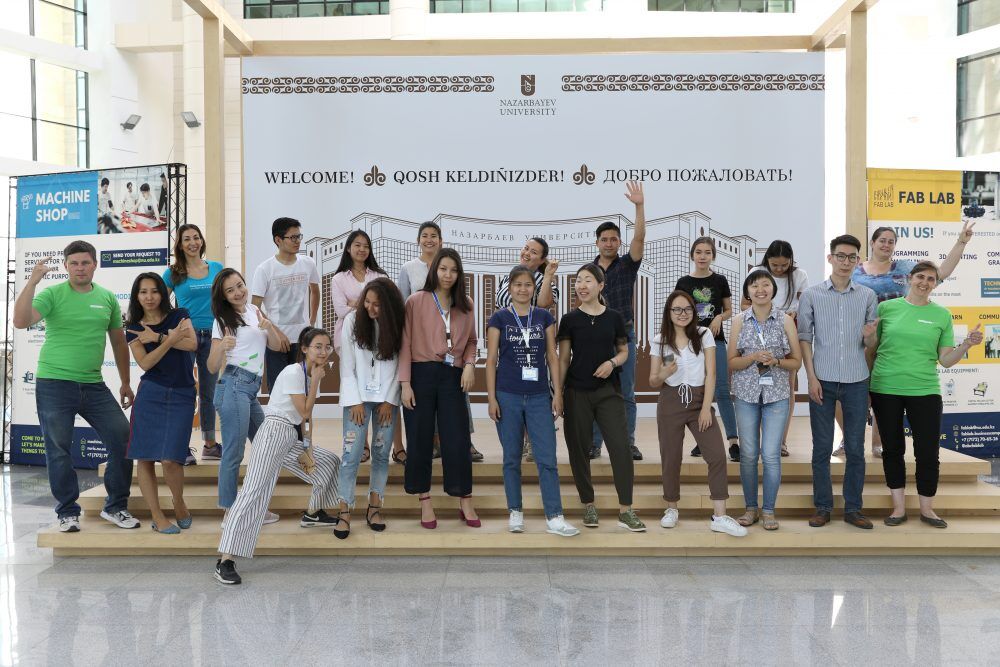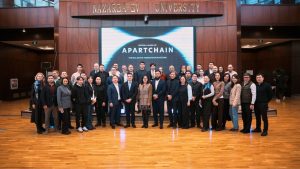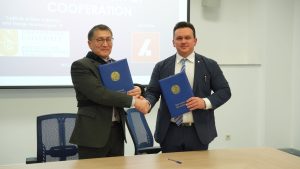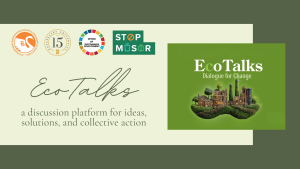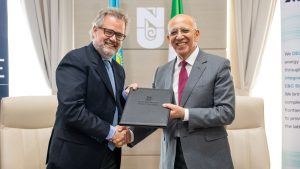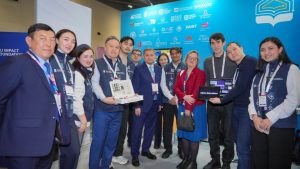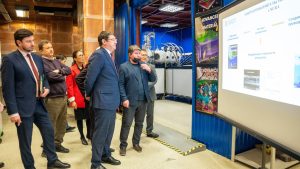Since its opening, NU has cultivated a culture of respect for the environment. NU not only tries to plan and follow a “green” agenda, but has also been committed to the development of green technologies. Gulzhan Yermekova, the head of the Green Campus and Environment Development Office, told us about the office’s current projects and the results of the recent Climate Launchpad competition held at NU.
– The Green Campus project was launched in 2016 in order to promote a culture of respect for the environment and to develop environmental sustainability at the University. Today, our Green Campus office, the Green Campus University Committee and the NU Green Society student community are participating in the project.
The main tasks of the Office include coordinating all university activities in the field of sustainable development, developing strategic documents and environmental policy, as well as coordinating activities related to environmental protection projects. The Green Campus office works very closely with the NU Green Society, a student organization with more than 50 students. We are pleased to support our students’ eco initiatives, such as Green Week, master classes, eco-trips and many others. The Green Campus Committee is a ‘think tank’ project organization that generates ideas and projects and discusses their implementation. It also discusses the most pressing issues related to environmental life on our university campus that need to be addressed. The committee includes professors, researchers, students, heads of subsidiaries and structural units of the University.
This year, the Office launched a Sustainability Living Lab program to support students’ and employees’ research and innovation projects on campus. To date, five projects have been implemented under this program: a greenhouse, farm corner, biodiesel, paidamate and a green box. In September, the second stage of applications for participation in the program will begin. Our partner and sponsor of this program is Chevron.
Two priority environmental areas: reduction of greenhouse gas emissions and improvement of the waste management system were identified as the main areas for Green Campus in the near future. In order to achieve these goals, the Office is developing a five-generation Carbon Management Plan and is implementing a collection system for different types of waste on campus: waste paper, plastic, glass, batteries, mercury-containing lamps and others.
The office also pays serious attention to landscaping the campus. This year alone, about 600 trees were planted and donated to the university by Freedom Finance, Altyn Bank, Kazatomprom and Transtelecom. By the end of this year, we plan to plant about 1000 more trees.
– Recently, NU hosted one of the stages of the Climate Launchpad contest. Could you please tell us about its purpose and results?
– Yes, indeed, there is an international competition aimed at finding and supporting talents in the field of green and clean technologies, called the “Climate Launchpad Competition”, and NU recently hosted the national-level semi-final round. This is the second year that the event has been held at NU, and this year the Green Campus Office and Astana Business Campus were event partners. This year there were more than 80 applications from all over Kazakhstan interested in participating in the contest. There were 12 teams total who progressed to the semi-finals by proposing various ideas in the field of ecology and environmental protection. These teams came from from different parts of our country: Aktobe, Almaty, Kokshetau, Karaganda, Ust-Kamenogorsk, Taldykorgan.
Last week semifinalists took part in BootCamp training sessions with the participation of Elena Mesya, a coach from Climate Launchpad. Each of the participants of the Climate Launchpad contest got an opportunity to present their team and share their ideas. Working in teams helped them to analyze startup opportunities, studying business strategies and marketing basics. Upcoming, there will be a follow-up session in August, as well as a national final, the winner of which will go to the Grand Final in Amsterdam. In turn, we would like to thank all the teams for their participation in the competition, for their active citizenship in protecting and preserving the natural environment, and wish them good luck in the subsequent stages of the competition.
– Which of the most interesting projects presented at the contest could you highlight?
– All the projects submitted to the contest are interesting in their own way. And the most valuable thing about them is that all of them are aimed at solving society’s environmental problems and encouraging a culture of environmentalism within the population. I am glad that today more and more people are thinking about the need to improve environmental security and offer various ways to restore and maintain the ecological balance in the world.
As an example of wonderful ideas aimed at solving the accumulated environmental problems in the society, I can lists some the projects admired by the competition committee. The HydroPlat project, for example, aims to protect the environment from toxic waste by producing useful nanomaterials that will replace platinum in hydrogen cars. In particular, it involves the use of genetically modified cyanobacteria capable of absorbing hydrogen sulfide, converting hydrogen into gas and burning it to produce nanomaterials.
Another project proposes to treat waste water and drinking water for contamination with heavy metals of oil and oil products by using natural minerals such as bentonite and zeolite. Another interesting project is the idea of creating an absorbent that will conserve rainwater by absorbing and keeping it in the soil until the moment of drought, allowing plants to withstand dry conditions.
The TopyraQ project will recycle organic waste on mineral- and nutrient-rich landfills with the help of healthy worm dwellers. The production of organic fertilizer from bird droppings, using a biopreparation based on effective soil microorganisms (ESM), is proposed by the Super Microbes project. According to the author of this project, the recycling of bird droppings and the production of organic fertilizers will contribute to the reduction of air, soil and water pollution by toxic waste from poultry production.
Interesting projects in construction, production and business can also be highlighted. Thus, one of the projects proposes to produce construction materials with the addition of ordinary reeds (plants): cane bricks or cane slabs, which can be an alternative to the stone bricks or concrete slabs used in construction. Another project of Clear Air offers to equip chimneys of private houses and small boiler-houses with relatively inexpensive liquid filtration systems. The Ecocement project offers technology for the production of incombustible eco-cement, as well as the production of ultra-lightweight foam concrete based on the eco-cement.
Riddle’s business idea, which is to create a service to recycle used clothes and garments by hand-designing new outfits, is also interesting.
Each of the projects submitted to the contest is interesting and valuable in its own way, with its own rationality, and, most importantly, the desire to change our world for the better, make it cleaner, safer and more environmentally friendly. I am sure that such initiatives will help to achieve the goal of ensuring the safety of the natural environment and minimizing the negative consequences of human impact on the planet’s ecology.
